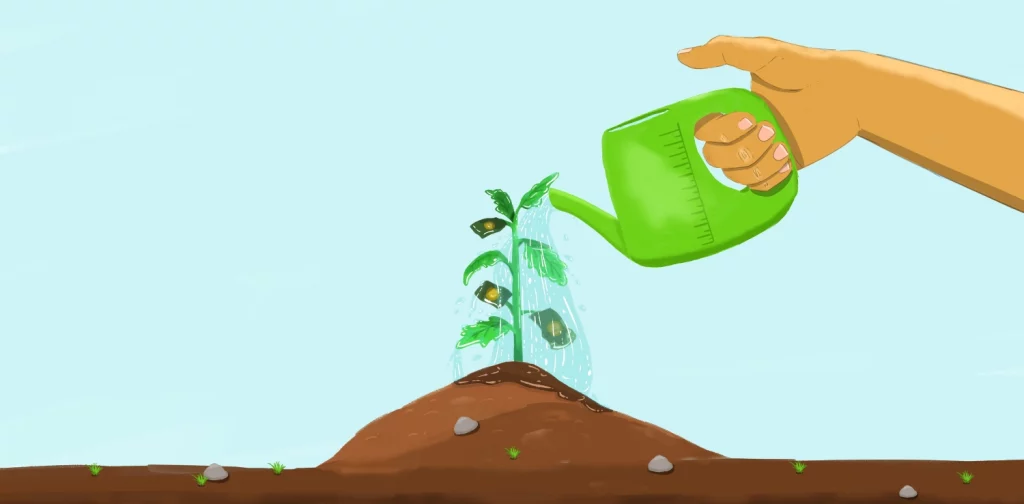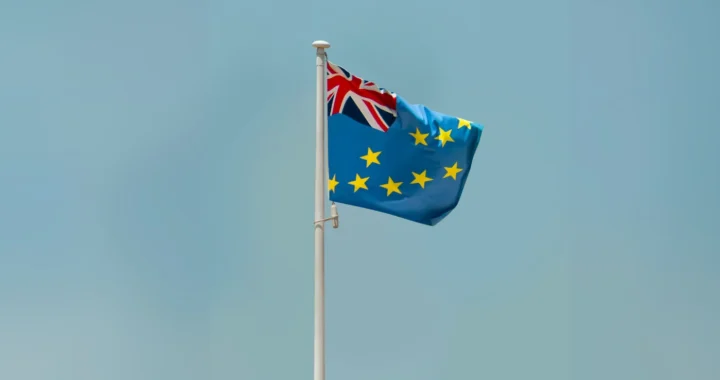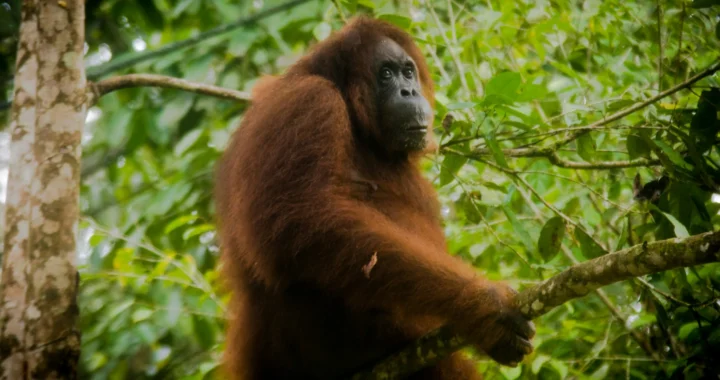Green Investment Towards a Golden Indonesia 2045: The Policymaking Perspective

Illustration by Irhan Prabasukma.
Raising awareness of climate change and sustainability in Indonesia is an uphill battle, but there is some progress. At a Vice Presidential Debate for the 2024 general election, terms like ‘greenflation’, carbon storage, and ecological conversion were mentioned. This should hint at the direction Indonesia is growing toward, emphasizing sustainable development, just transition, and green investment, but are we ready?
Expectation vs. Reality
The problematic fact is that today, the Indonesian government has not grasped a truly sustainable direction. The country’s neglect of climate change is projected to have negative effects. In 2022, the Ministry of National Development Planning of the Republic of Indonesia estimated that potential economic losses due to climate change would reach 544 trillion IDR (about 33.8 billion USD) during the 2020-2024 period.
The environmental and social damage caused by the investment in Morowali is valid evidence of a lack of attention to sustainability principles in our development plans. Even though economic growth in the region has reached double digits (20.34% in 2023), the poverty rate in the region also remains at double digits (12.5% in 2022). This is in line with the environmental Kuznets curve theory, which states that economic growth in developing countries is linear with the level of ecological damage.
Meanwhile, the Environmental Performance Index (EPI) gave Indonesia a score of 28.20 out of 100 (ranked 164th out of 180 countries). In addition, the Ministry of Energy and Mineral Resources estimated that the investment value in the renewable energy sector would decrease by 6.3% throughout 2023 compared to 2022. The investment targets currently being pursued seem to ignore the spirit of sustainability and are permissive towards destructive investment instead.
Thus, the country’s seriousness in supporting green investment appears false–merely lip service. What the government has stated so far appears to be inversely proportional to the facts and reality.
Urgency of Green Investment
Implementing green investment is urgent amidst the challenges of global climate change. Environmental damage due to rampant unsustainable practices is a consequence of the desire to pursue economic growth, especially in developing countries.
According to Simon Kuznets, in the initial phase of economic growth, pollution increases and environmental quality decreases. This is where we are now. However, after a certain level of per capita income (which will vary for different indicators), the trend reverses so that at high-income levels, economic growth leads to environmental improvement. This is the ultimate goal of green investment, bringing growth that positively impacts environmental quality.
In the long term, Indonesia has inserted green investment as part of achieving the vision of a Golden Indonesia 2045. The government has launched a policy direction for implementing a green economy based on low-carbon development, one of which is strengthening the implementation of a fair system of fiscal and non-fiscal incentives and disincentives. The 2025-2045 National Long‐Term Development Plan (RPJPN) states that the government will develop green financing and implement carbon pricing to support green investment.
The government’s commitment in the future to strengthen the implementation of the green economy is also contained in the current president-elect’s vision and mission, Asta Cita. At a glance, Prabowo’s Asta Cita is in line with the RPJPN, which envisions accelerating the energy transition, implementing a circular economy, developing green transportation, and adopting green technology. Of course, it will be a big responsibility for Prabowo’s government to better manage our country’s environment and prove Asta Cita to be more than a political promise to the public.
A Pile of Homework
The problem today is that there is almost no clear definition of green investment in the Indonesian government’s institutional dictionary. Furthermore, the country also lacks a roadmap for green investment plans. These result in the lack of clear direction for the central and regional governments on how to approach this issue. Indonesia seems to be walking toward ecological conversion without any guidance.
Green investment has been discussed in public but has not yet penetrated the minds of policymakers. The absence of a green investment regulatory umbrella at the central level means other regions do not have a clear reference. Ultimately, the implementation of green investments usually only depends on the goodwill and enthusiasm of the region. As a result, regions that are committed and have legal products related to green investment can be counted on the fingers of one hand.
In Indonesia, the governance of sustainable development and green investment is not under the auspices of a ministry-level institution. Outside, countries such as Georgia and Croatia are placing this issue as a priority and institutionalizing it within the Ministry of Economy and Sustainable Development. Consequently, the absence of centralized green investment planning also means the absence of budget support. In comparison, South Korea allocates 2% of its GDP to support green investment.
The realization of green investment must be supported by concrete policies and budgeting. So, high-level institutionalization is a vital first step.
Pathways to Realization
There are several paths the Indonesian government can take to support green investment. One of them is forcing companies involved in exploitative business to prepare a Sovereign Wealth Fund (SWF). State-owned companies such as Pertamina can be pioneers in implementing SWF in their internal finances. This practice operates in Norway, obliging exploitative businesses to set aside 3% of their profits for SWFs. Timor Leste has also implemented the Petroleum Fund.
Implementing SWF is a form of the state’s commitment to creating justice across generations. This fund can become a way to ensure that instead of only the damages, the benefits of mineral resource exploration can trickle down from one generation to the next. Of course, if the country is still working within the existing generational justice paradigm, its resilience will be at stake in the future, especially when natural resources become scarce.
Another reformist path is strengthening institutions focusing on sustainability and the green economy. If forming ministries is considered part of institutional strengthening, the state can form multi-stakeholder forums from central to regional levels. The reality so far shows that the existing involvement is only a formality. This is different from what happened in Sweden, which was open in policy formulation to the clarity of the flow of action plans by the Parliament (Riksdag).
Last but not least, research support by the Indonesian government is essential to strengthen the green investment ecosystem. The government must encourage more research on investment intelligence and the identification of diverse green economic potentials across regions. An ideal green investment policy framework will positively impact economic growth, green jobs, and state and regional revenues.
Bottom Line
In the end, the government has the technocratic power to create an advanced Indonesia without destroying the environment. Sure, carbon trading platforms and taxes are opportunities to force industries to reduce their emissions. On the other hand, the government must also open the doors to collaboration with civil society groups, researchers, businesses, and other key actors to realize the implementation of green investment for Indonesia’s equity, prosperity, and sustainable future.
Editor: Nazalea Kusuma & Kresentia Madina
Publish your thought leadership and insights with Green Network Asia, learn more about our Op-ed Article Guidelines.

Subscribe to Green Network Asia
Strengthen your personal and professional development with cross-sectoral insights on sustainability-related issues and sustainable development across the Asia Pacific and beyond.

Eduardo Ramda
Eduardo is a Policy Analyst at the Regional Autonomy Watch (KPPOD). He is also actively participating in scientific conferences and advocating for public policies, both at Indonesian sub-national and national levels.


 Looking into Biochar as a Bioremediation Agent
Looking into Biochar as a Bioremediation Agent  Australian Climate Visa for Citizens of Tuvalu: Showcasing cross-border partnership in light of the climate crisis
Australian Climate Visa for Citizens of Tuvalu: Showcasing cross-border partnership in light of the climate crisis  Nickel Mining in Raja Ampat and the Widespread Cost of Natural Resource Exploitation
Nickel Mining in Raja Ampat and the Widespread Cost of Natural Resource Exploitation  Lumbung Sosial: Challenges and Opportunities of Indonesia’s Social Barn Program
Lumbung Sosial: Challenges and Opportunities of Indonesia’s Social Barn Program  A Worrying State of Insect Decline
A Worrying State of Insect Decline  GEF Approves Funding for Biodiversity Conservation Projects in Indonesia
GEF Approves Funding for Biodiversity Conservation Projects in Indonesia